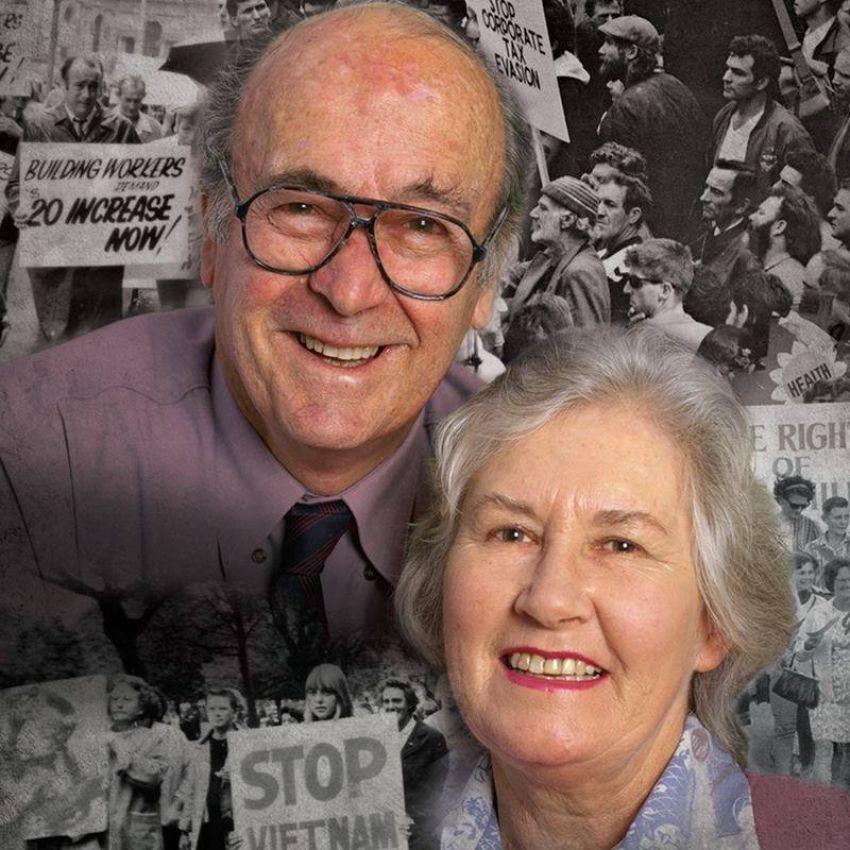
Tom McDonald, a veteran leader of Australia’s trade union and Communist movements, died in Gosford Hospital on April 18 at the age of 95.
The Australian Council of Trade Unions (ACTU) described Tom as a “union legend” who fought for universal superannuation, accident pay for injured workers, long service leave and the minimum wage system. It said Tom had a “lifelong commitment to passing on what one generation had learnt onto another”.
“Tom McDonald was [at various stages] the national secretary of the Building Workers Industrial Union (BWIU) and vice president of the ACTU. [The BWIU amalgamated with other unions in the early 1990s to form the Construction, Forestry, Mining and Energy Union (CFMEU).]
“Tom started work as a ships’ carpenter and joiner at Sydney’s Cockatoo Docks at a time of very low wages, terrible safety standards, no support for injured workers, long hours, insecurity and no superannuation. By the time he retired as leader of his union 1991 he had transformed his industry.”
Dave Noonan, CFMEU National Construction and General Division Secretary, wrote: “Tom was a legend of our union; a driving force in the formation of the CFMMEU and the establishment of superannuation for construction workers.
“Tom came from a background of poverty in the Sydney suburb of Glebe and became a socialist. He never forgot where he came from and never gave up the good fight for workers’ rights, social justice and economic equality.
“Tom inspired generations of unionists in leading his own union, and in mentoring many union leaders at Organising Works.”
In her 1999 review of Intimate Union: Sharing a Revolutionary Life, an autobiographical book by Tom and his lifelong partner Audrey, Melanie Sjoberg wrote: “Tom vividly recalls his early memories of struggles with other workers to consolidate awards and to clean up the building industry and discusses the NSW Builders Labourers Federation’s (BLF) green bans. He says the [pro-Moscow] Socialist Party [which split from the Communist Party of Australia in 1971] mistakenly characterised these as trendy, isolated attempts to protect the environment — in reality they were a consistent campaign as part of a broad movement.
“Tom defines the [1980s Prices and Incomes] Accord as a conscious agreement between government and the ACTU which created the most highly centralised and regulated wages system in Australian history. He states the Accord ‘achieved what the [Industrial Relations Commission] was never quite able to achieve: an end to union inspired wage increases outside the arbitration system’. This aroused opposition from workers and challenged union leaders with the task of policing and disciplining members.
“Tom says the Accord brought significant gains in social reforms, such as superannuation and family policy, but there was less success in the battle against deregulation of the finance sector, the entry of foreign banks or achieving a more interventionist industry policy. Unfortunately, he doesn’t draw a balance sheet on this. The Accord provided the largest ever shift in income from the working class to government and big business.”
Tom first joined the early Socialist Party of Australia (SPA) and later split in 1984, along with other union officials, to become part of the Association of Communist Unity (ACU) after the SPA took a position against the class-collaborationist Accord. Tom was allied to the pro-Accord sections of the ACTU, the Communist Party of Australia and the Labor Party.
Tom and Audrey published a joint memoir in 2016 titled Dare to Dream: The memoirs of Tom and Audrey McDonald. Steve Frenkel’s review described it as “a clear, animated and absorbing account of two significant labour movement veterans” recounting the “trials, tribulations and successes of Tom and Audrey McDonald in their respective, yet overlapping domains of trade unionism (Tom), the women’s movement (Audrey), peace and international working-class solidarity and left-wing politics.
“But it is more than this, Dare to Dream is about social relationships: family and the many comrades who shared their values and engaged in struggles for social change.”
Tom is survived by his partner Audrey and their three children.